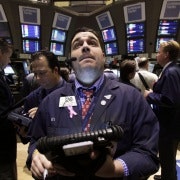Divestment's big week; Nigeria kickstarts solar
Climate financing, fossil-fuel divestment and other initiatives aimed at stemming the effects of global warming were discussed in New York City during ‘Climate Week’ over 22-26 September.
The official programme, organised by UN Secretary General Ban Ki-moon, brought together political and business leaders including US President Barack Obama and Unilever chief executive Paul Polman. Hollywood actor Leonardo DiCaprio was also among the who’s who of attendees.
The week kicked off on 21 September by hundreds of thousands of marchers through Manhattan cities around the world demanding government action on climate change. The People’s Climate March drew more than 310,000 people to New York, organisers said, tripling the original forecast.
‘We need to demonstrate there are an awful lot of people that care about climate change and demonstrate that this is a huge issue for all kinds of people,’ Bill McKibben, the head of 350.org, the organising group, told Bloomberg News. ‘Since the fossil fuel companies have money, we have to have something on our side, and that’s people.’
As part of the event, nations pledged money for climate finance. France led the discussion by offering $US1 billion to the Green Climate Fund, while other countries put forward smaller sums. Outside the official proceedings, discussions focused on action being taken by companies, cities and municipalities – rather than at the national or international level.
The fossil fuel industry came under particular scrutiny last week. A foundation tied to the Rockefeller family, heirs to the Standard Oil fortune, announced that it is joining other groups in exiting coal and tar sands investments. Mars and 11 other companies unveiled plans to phase out fossil-fuel use.
‘We are immediately divesting from coal and tar sands, the most carbon-intensive fuels,’ Stephen Heintz, president of the Rockefeller Brothers Fund, said. Given the source of the fortune, ‘it’s a very important signal to the market’.
Fossil fuels have traditionally been a favourite investment. The combination of scale, liquidity, value growth and yield provided by fossil fuel holdings is not easily matched by another asset class. A White Paper by Bloomberg New Energy Finance estimated that oil, gas and coal accounted for nearly $5 trillion of current stock market values.
The Rockefeller Brothers Fund, which has assets of $860 million and is separate from the larger Rockefeller Foundation, will assess how to cut other fossil fuel investments while boosting renewable energy companies, he said.
While the conversations that took place at Climate Week were largely positive, Bloomberg New Energy Finance does not see it changing the direction for international negotiations on a climate treaty.
According to last week’s Analyst Reaction, What happened at Climate Week NYC?, Bloomberg New Energy Finance expects some form of ‘deal’ to be signed at COP21 in Paris, but it will not be a top-down grand bargain on long-term emission reductions, nor will it create a global framework to price carbon. Instead, the Paris deal will likely resemble the hotchpotch of Nationally Appropriate Mitigation Actions put forward by each country under the Cancun Agreements.
In other news last week, sub-Saharan Africa looked as if it may be on its way to realising its renewable energy potential.
Global Business Resources USA, a US-based infrastructure-finance company, plans to develop two 50MW photovoltaic plants in Nigeria. The company has submitted a proposal to the country’s power ministry to build the parks for $106 million at Kumbotso in Kano State and Karu near Abuja, Nigeria’s ministry of information said on its website. The plants would provide electricity for $0.02/kWh, it said.
Despite being sub-Saharan Africa’s biggest economy, Nigeria is fairly new to renewable energy development, with only 62MW of small hydro capacity and 138mLpa of biofuels commissioned to date. However, interest is ramping up, particularly in solar thanks to its plentiful resources and comparatively generous feed-in tariff: Nigeria is on course to see its first PV plants come online in 2015, with two under construction amounting to an aggregate 31MW of capacity. The country has even loftier ambitions for solar, aiming to build 300MW of PV plants and 300MW of solar thermal by the end of next year.
There are similar renewable ambitions across sub-Saharan Africa’s 48 countries. As Bloomberg New Energy Finance’s H2 2014 Sub-Saharan Africa Market Outlook finds, this year is set to see more renewable energy capacity come online in the region than was commissioned over 2000-13.
Chart of the week: By 2017, there could be an additional 3 billion litres of renewable diesel capacity online globally
Originally published by Bloomberg New Energy Finance. Reproduced with permission.

















